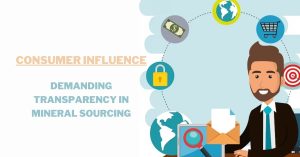In an era where consumers are becoming increasingly conscientious about the products they purchase, the spotlight is now shining on the often murky and complex world of mineral sourcing. From smartphones to electric vehicles, many everyday products rely on minerals such as tin, tantalum, tungsten, and gold, often referred to as conflict minerals due to their association with human rights abuses and environmental degradation in certain regions. As consumers become more aware of these ethical concerns, there is a growing demand for transparency in mineral sourcing, forcing companies to rethink their supply chain practices. Amidst the heightened scrutiny of mineral sourcing, conflict mineral compliance has become a crucial aspect of corporate responsibility.
The Rise of Ethical Consumerism
Consumers today are more informed and socially conscious than ever before. They seek not only high-quality products but also assurance that their purchases align with their ethical values. The demand for transparency in mineral sourcing is a natural extension of this ethos. Understanding the often-violent circumstances surrounding the extraction of conflict minerals, consumers are pushing for accountability from the companies whose products they buy.
Corporate Responsibility in the Spotlight
In response to this demand, companies are recognizing the importance of being transparent about their mineral supply chains. Corporate responsibility is no longer just a buzzword; it’s a business imperative. Companies, with the support of SDS services, are taking steps to trace the journey of minerals from the extraction site to the finished product, ensuring that every step adheres to ethical and sustainable practices. This not only meets consumer expectations but also helps build trust in the brand.
Technological Solutions for Transparency
Advancements in technology, including the integration of CAD drawing services, are playing a crucial role in achieving transparency in mineral sourcing. Blockchain, for example, has emerged as a powerful tool for creating immutable and transparent supply chain records. Companies can use blockchain to track the origin of minerals, providing a tamper-proof ledger that ensures authenticity and ethical sourcing. This level of transparency satisfies consumer concerns and allows companies to identify and eliminate any potential issues within their supply chains.
Challenges and Opportunities
While the push for transparency is commendable, it is not without its challenges. Supply chains are intricate networks involving numerous stakeholders, and ensuring transparency at every stage can be complex. Additionally, some regions where these minerals are sourced may lack the infrastructure for effective monitoring. However, these challenges present opportunities for innovation and collaboration. Companies that invest in finding solutions to these hurdles demonstrate a commitment to ethical practices, further enhancing their reputation among consumers.
In this landscape, embedded software development services play a pivotal role. Leveraging advanced technologies and programming expertise, these services contribute to the development of systems that enhance supply chain transparency. By integrating embedded software solutions, companies can streamline data collection, analysis, and communication, facilitating a more transparent and traceable mineral sourcing process. This not only addresses the challenges posed by complex supply chains but also aligns with the commitment to ethical practices, reinforcing consumer trust and corporate responsibility.
Educating the Consumer
Transparency is a two-way street. As consumers demand more information about the products they purchase, companies must also take the initiative to educate their customers. Clear communication about supply chain practices, the steps taken to ensure ethical sourcing, and the challenges faced in achieving transparency can foster a deeper understanding among consumers. This education not only builds trust but also reinforces the importance of supporting companies that prioritize ethical considerations.
The Future of Mineral Sourcing
As consumer awareness continues to grow, the demand for transparency in mineral sourcing will likely intensify. Companies that embrace and champion ethical practices will not only meet regulatory requirements but also gain a competitive edge in an increasingly discerning market. The future of mineral sourcing is one where consumers wield their purchasing power to drive positive change, promoting sustainability and ethical practices across industries. In this evolving landscape, transparency is not just a corporate responsibility; it’s a strategic imperative that shapes the relationship between companies and their socially conscious consumers.
